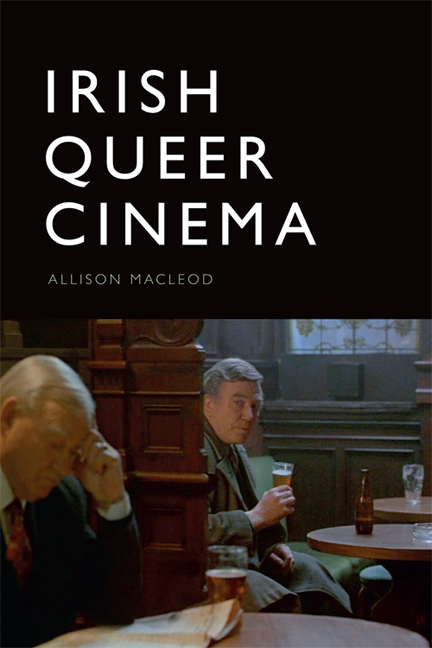Book contents
- Frontmatter
- Contents
- List of Figures
- Acknowledgements
- 1 Queerly National and Nationally Queer: Paradoxes of an Irish Queer Cinema
- 2 Mapping Ireland’s Queer Films
- 3 Re-imagined Kinship and Failed Communities
- 4 The Contested Space of the Irish Pub
- 5 Compartmentalised Cosmopolitans and Rigid Fluidity
- 6 The Queerly Productive Constraints of Rural Space
- 7 Queer Mobilities and Disassociated Masculinities
- 8 Contested Belongings within Diasporic Space
- 9 The Irish Queer Short Film
- 10 Concluding Remarks
- Select Filmography
- Bibliography
- Index
4 - The Contested Space of the Irish Pub
Published online by Cambridge University Press: 04 May 2021
- Frontmatter
- Contents
- List of Figures
- Acknowledgements
- 1 Queerly National and Nationally Queer: Paradoxes of an Irish Queer Cinema
- 2 Mapping Ireland’s Queer Films
- 3 Re-imagined Kinship and Failed Communities
- 4 The Contested Space of the Irish Pub
- 5 Compartmentalised Cosmopolitans and Rigid Fluidity
- 6 The Queerly Productive Constraints of Rural Space
- 7 Queer Mobilities and Disassociated Masculinities
- 8 Contested Belongings within Diasporic Space
- 9 The Irish Queer Short Film
- 10 Concluding Remarks
- Select Filmography
- Bibliography
- Index
Summary
The sustained presence of the public house (‘pub’) in Irish film, drama and literature indicates that it is integral to the Irish cultural imaginary. Particularly in Irish films and films about Ireland, the pub is a recurring image, from a site for rural community gatherings in The Quiet Man (Ford 1952) and Ryan's Daughter (Lean 1970), to a space where men can escape from the pressures of home and work life in Angela's Ashes (Parker 1999) and Intermission (Crowley 2003), to a target for paramilitary violence in Resurrection Man (Evans 1998) and Mickybo and Me (Loane 2004). Within these films, there is a strong tendency to highlight the importance of the Irish pub to the construction, performance and regulation of Irish ethnicity and masculinity.
Consider, for instance, the scene in The Quiet Man when American Sean Thornton, recently arrived in the film's fictional Irish village of Innisfree, walks into the pub that adjoins the hotel where he is staying. As he enters the darkly lit space, carefully closing the door behind him, he becomes subject to the stares of the other male patrons. The camera tracks his movement towards the bar in a medium close-up shot that emphasises the confined space and this tracking movement mirrors the silent stares of the watching patrons. Sean orders a pint and then, as he lights a cigarette and the camera cuts to a close-up shot of his face, he looks around in sudden awareness of the attention that is still focused on him. In an attempt to win over the other patrons he offers to buy them a round of drinks, at which point he is approached by an elderly man, Francis Ford, who tells him to identify himself. Once Sean has referenced the names of his father and grandfather (both former residents of the village), Francis announces: ‘That being the case, it is a pleasant evening and we will have a drink!’ An accordionist begins to play ‘The Wild Colonial Boy’, a traditional Irish ballad, and the other patrons gather around the bar, and Sean, and sing along. What this brief sequence illustrates is that not only is the pub a space populated by men, but it is a space structured by a dominant social order and strict code of conduct.
- Type
- Chapter
- Information
- Irish Queer Cinema , pp. 48 - 66Publisher: Edinburgh University PressPrint publication year: 2018



